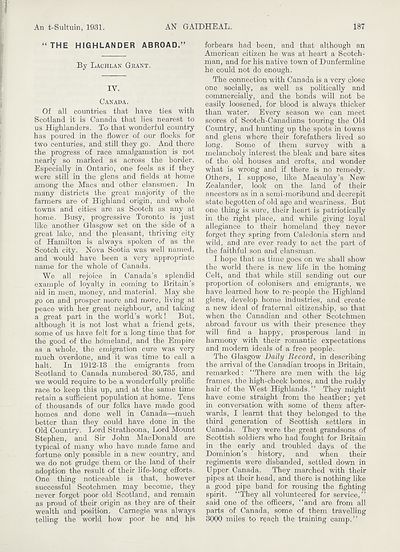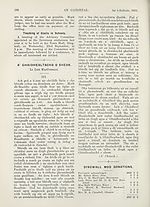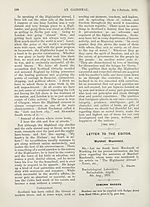An Comunn Gàidhealach Publications > Gaidheal > Volume 26, October 1930--September 1931
(243) Page 187
Download files
Complete book:
Individual page:
Thumbnail gallery: Grid view | List view

An t-Sultuin, 1931.
AN GAIDHEAL.
187
“THE HIGHLANDER ABROAD.”
By Lachlan Grant.
IV.
Canada.
Of all countries that have ties with
Scotland it is Canada that lies nearest to
us Highlanders. To that wonderful country
has poured in the flower of our flocks for
two centuries, and still they go. And there
the progress of race amalgamation is not
nearly so marked as across the border.
Especially in Ontario, one feels as if they
were still in the glens and fields at home
among the Macs and other clansmen. In
many districts the great majority of the
farmers are of Highland origin, and whole
towns and cities are as Scotch as any at
home. Busy, progressive Toronto is just
like another Glasgow set on the side of a
great lake, and the pleasant, thriving city
of Hamilton is always spoken of as the
Scotch city. Nova Scotia was well named,
and would have been a very appropriate
name for the whole of Canada.
We all rejoice in Canada’s splendid
example of loyalty in coming to Britain’s
aid in men, money, and material. May she
go on and prosper more and more, living at
peace with her great neighbour, and taking
a great part in the world’s work! But,
although it is not lost what a friend gets,
some of us have felt for a long time that for
the good of the homeland, and the Empire
as a whole, the emigration cure was very
much overdone, and it was time to call a
halt. In 1912-13 the emigrants from
Scotland to Canada numbered 30,735, and
we would require to be a wonderfully prolific
race to keep this up, and at the same time
retain a sufficient population at home. Tens
of thousands of our folks have made good
homes and done well in Canada—much
better than they could have done in the
Old Country. Lord Strathcona, Lord Mount
Stephen, and Sir John MacDonald are
typical of many who have made fame and
fortune only possible in a new country, and
we do not grudge them or the land of their
adoption the result of their life-long efforts.
One thing noticeable is that, however
successful Scotchmen may become, they
never forget poor old Scotland, and remain
as proud of their origin as they are of their
wealth and position. Carnegie was always
telling the world how poor he and his
forbears had been, and that although an
American citizen he was at heart a Scotch¬
man, and for his native town of Dunfermline
he could not do enough.
The connection with Canada is a very close
one socially, as well as politically and
commercially, and the bonds will not be
easily loosened, for blood is always thicker
than water. Every season we can meet
scores of Scotch-Canadians touring the Old
Country, and hunting up the spots in towns
and glens where their forefathers lived so
long. Some of them survey with a
melancholy interest the bleak and bare sites
of the old houses and crofts, and wonder
what is wrong and if there is no remedy.
Others, I suppose, like Macaulay’s New
Zealander, look on the land of their
ancestors as in a semi-moribund and decrepit
state begotten of old age and weariness. But
one thing is sure, their heart is patriotically
in the right place, and while giving loyal
allegiance to their homeland they never
forget they spring from Caledonia stem and
wild, and are ever ready to act the part of
the faithful son and clansman.
I hope that as time goes on we shall show
the world there is new life in the homing
Celt, and that while still sending out our
proportion of colonisers and emigrants, we
have learned how to re-people the Highland
glens, develop home industries, and create
a new ideal of fraternal citizenship, so that
when the Canadian and other Scotchmen
abroad favour us with their presence they
will find a happy, prosperous land in
harmony with their romantic expectations
and modem ideals of a free people.
The Glasgow Daily Record, in describing
the arrival of the Canadian troops in Britain,
remarked: “There are men with the big
frames, the high-cheek bones, and the ruddy
hair of the West Highlands.” They might
have come straight from the heather; yet
in conversation with some of themi after¬
wards, I leamt that they belonged to the
third generation of Scottish settlers in
Canada. They were the great grandsons of
Scottish soldiers who had fought for Britain
in the early and troubled days of the
Dominion’s history, and when their
regiments were disbanded, settled down in
Upper Canada. They marched with their
pipes at their head, and there is nothing like
a good pipe band for rousing the fighting
spirit. “They all volunteered for service,”
said one of the officers, “and are from all
parts of Canada, some of them travelling
3000 miles to reach the training camp.”
AN GAIDHEAL.
187
“THE HIGHLANDER ABROAD.”
By Lachlan Grant.
IV.
Canada.
Of all countries that have ties with
Scotland it is Canada that lies nearest to
us Highlanders. To that wonderful country
has poured in the flower of our flocks for
two centuries, and still they go. And there
the progress of race amalgamation is not
nearly so marked as across the border.
Especially in Ontario, one feels as if they
were still in the glens and fields at home
among the Macs and other clansmen. In
many districts the great majority of the
farmers are of Highland origin, and whole
towns and cities are as Scotch as any at
home. Busy, progressive Toronto is just
like another Glasgow set on the side of a
great lake, and the pleasant, thriving city
of Hamilton is always spoken of as the
Scotch city. Nova Scotia was well named,
and would have been a very appropriate
name for the whole of Canada.
We all rejoice in Canada’s splendid
example of loyalty in coming to Britain’s
aid in men, money, and material. May she
go on and prosper more and more, living at
peace with her great neighbour, and taking
a great part in the world’s work! But,
although it is not lost what a friend gets,
some of us have felt for a long time that for
the good of the homeland, and the Empire
as a whole, the emigration cure was very
much overdone, and it was time to call a
halt. In 1912-13 the emigrants from
Scotland to Canada numbered 30,735, and
we would require to be a wonderfully prolific
race to keep this up, and at the same time
retain a sufficient population at home. Tens
of thousands of our folks have made good
homes and done well in Canada—much
better than they could have done in the
Old Country. Lord Strathcona, Lord Mount
Stephen, and Sir John MacDonald are
typical of many who have made fame and
fortune only possible in a new country, and
we do not grudge them or the land of their
adoption the result of their life-long efforts.
One thing noticeable is that, however
successful Scotchmen may become, they
never forget poor old Scotland, and remain
as proud of their origin as they are of their
wealth and position. Carnegie was always
telling the world how poor he and his
forbears had been, and that although an
American citizen he was at heart a Scotch¬
man, and for his native town of Dunfermline
he could not do enough.
The connection with Canada is a very close
one socially, as well as politically and
commercially, and the bonds will not be
easily loosened, for blood is always thicker
than water. Every season we can meet
scores of Scotch-Canadians touring the Old
Country, and hunting up the spots in towns
and glens where their forefathers lived so
long. Some of them survey with a
melancholy interest the bleak and bare sites
of the old houses and crofts, and wonder
what is wrong and if there is no remedy.
Others, I suppose, like Macaulay’s New
Zealander, look on the land of their
ancestors as in a semi-moribund and decrepit
state begotten of old age and weariness. But
one thing is sure, their heart is patriotically
in the right place, and while giving loyal
allegiance to their homeland they never
forget they spring from Caledonia stem and
wild, and are ever ready to act the part of
the faithful son and clansman.
I hope that as time goes on we shall show
the world there is new life in the homing
Celt, and that while still sending out our
proportion of colonisers and emigrants, we
have learned how to re-people the Highland
glens, develop home industries, and create
a new ideal of fraternal citizenship, so that
when the Canadian and other Scotchmen
abroad favour us with their presence they
will find a happy, prosperous land in
harmony with their romantic expectations
and modem ideals of a free people.
The Glasgow Daily Record, in describing
the arrival of the Canadian troops in Britain,
remarked: “There are men with the big
frames, the high-cheek bones, and the ruddy
hair of the West Highlands.” They might
have come straight from the heather; yet
in conversation with some of themi after¬
wards, I leamt that they belonged to the
third generation of Scottish settlers in
Canada. They were the great grandsons of
Scottish soldiers who had fought for Britain
in the early and troubled days of the
Dominion’s history, and when their
regiments were disbanded, settled down in
Upper Canada. They marched with their
pipes at their head, and there is nothing like
a good pipe band for rousing the fighting
spirit. “They all volunteered for service,”
said one of the officers, “and are from all
parts of Canada, some of them travelling
3000 miles to reach the training camp.”
Set display mode to:
![]() Universal Viewer |
Universal Viewer | ![]() Mirador |
Large image | Transcription
Mirador |
Large image | Transcription
| An Comunn Gàidhealach > An Comunn Gàidhealach Publications > Gaidheal > Volume 26, October 1930--September 1931 > (243) Page 187 |
|---|
| Permanent URL | https://digital.nls.uk/125155320 |
|---|
| Description | This contains items published by An Comunn, which are not specifically Mòd-related. It includes journals, annual reports and corporate documents, policy statements, educational resources and published plays and literature. It is arranged alphabetically by title. |
|---|
| Description | A collection of over 400 items published by An Comunn Gàidhealach, the organisation which promotes Gaelic language and culture and organises the Royal National Mòd. Dating from 1891 up to the present day, the collection includes journals and newspapers, annual reports, educational materials, national Mòd programmes, published Mòd literature and music. |
|---|---|
| Additional NLS resources: |
|

